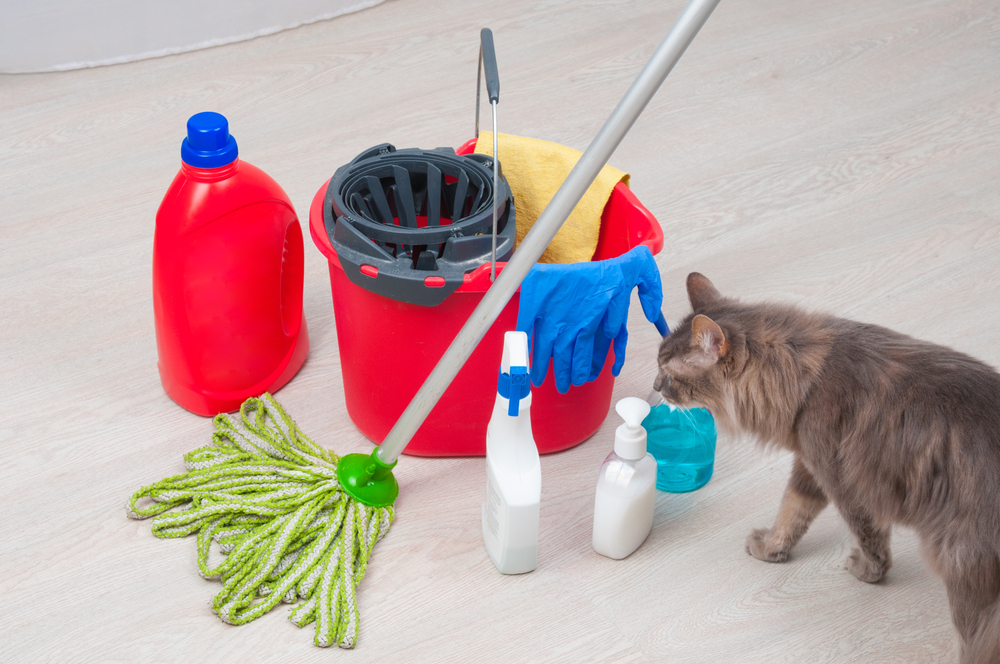Many common household foods, medications, plants, and chemicals are toxic to pets. We explain these four categories of common household pet toxins, and how to keep your pet safe. Remember—if you ever think your pet may have been exposed to a poison, call Animal Care and Emergency Services, as well as the Animal Poison Control Center, whether or not your pet seems sick.
#1: Household foods toxic to pets
Call us right away if your pet ingests any of the following:
- Chocolate or coffee — Dark chocolate and baking chocolate are the most toxic forms, and can cause vomiting, diarrhea, arrhythmias, seizures, and death.
- Grapes and raisins — As few as 10 raisins can poison a 10-pound dog and cause kidney failure.
- Xylitol — Pets who ingest this sugar-free sweetener will likely need emergency treatment for vomiting, lethargy, and seizures, because of low blood sugar. They may also need monitoring for liver damage for several days after ingestion.
- Macadamia nuts — Signs, including weakness, vomiting, tremors, and hyperthermia, may not arise for 12 hours after your pet ingests these nuts, so your pet needs veterinary attention, whether or not they seem sick
- Onions, garlic, and chives — Dogs, and especially cats, can suffer stomach irritation, red blood cell damage, and anemia.
- Undercooked or raw meat, bones, or eggs — Harmful bacteria (e.g., E. coli and Salmonella) can cause illness in pets who eat spoiled or raw foods.
- Salt — Severe thirst and sodium poisoning can ensue, since pets often eat salty snack foods to excess.
- Avocado — These can put some pets at risk for heart damage and death.
- Alcohol — Small amounts can cause poisoning in pets. Spilled cocktails and the alcohol from yeast dough are common sources.
#2: Common medications toxic to pets
Always store human medications, which should never be given to pets, separately from pet medications, and read all labels carefully.
- Human medications — Pets who are exposed to or ingest human medications, both over-the-counter and prescription (e.g., ibuprofen or other NSAIDs, aspirin, and prozac) need veterinary care.
- Nicotine patches and cessation products, e-cigarette liquid, and cigarettes — Ingestion can lead to elevated heart rate, blood pressure, respiratory failure, and death in pets.
- Pet medications — The wrong amount of pet medication, or pet medication given to the wrong pet, can cause serious interactions or side effects.
- Pet flea control products — Check labels carefully, since products labeled for dogs only can be toxic to cats. Apply only as directed, in the recommended amounts and frequency.
#3: Common house plants toxic to pets
Pets who ingest any plant material may experience vomiting, but many plants are severely toxic to pets, including these common holiday plants:
- Lilies — These are severely toxic to cats, who may suffer severe kidney damage, despite ingesting only a small amount, or drinking a small amount of the vase water.
- Cannabis — Ingestion can cause depression, incoordination, incontinence, and seizures in pets.
- Holly — The berries can cause vomiting, diarrhea, and lethargy.
- Mistletoe — Ingestion can lead to low blood pressure, seizures, and death.
- Tulips and narcissus — Pets who ingest these bulbs can develop heart problems and seizures.
- Peace lily — Calcium oxalate crystals from these lilies can burn a pet’s lips, mouth, and tongue.
#4: Common chemicals toxic to pets

Be aware of the following household products and items that are toxic to pets:
- Rodenticides — Rat poison works on cats and dogs the same way as rodents. We recommend that you not use these products, or at a minimum, ensure that they are never kept in pets’ reach.
- Household batteries — When pets chew or swallow batteries, the alkaline battery acid destroys tissue, causing ulcers and “burns.”
- Pennies — Ingestion by a dog of one post-1982 penny can cause zinc poisoning with red blood cell and kidney damage.
- Antifreeze — Pets initially appear drunk, and then seem OK, but their kidneys are already damaged.
- Lye and household cleaners — Irritation and deep tissue damage will ensue after pets are topically exposed to, or ingest, these cleaners.
- Essential oils and liquid potpourri — Stomach irritation, neurological problems, and liver damage can result from ingestion, especially in cats.
- Dryer sheets — Chewing and ingesting a new dryer sheet—versus a used sheet—can cause drooling, vomiting, and ulcers in pets.
Call Animal Care and Emergency Services whenever questions arise about a possible pet poisoning. If you suspect pet toxin exposure, look carefully for any household items they may have ingested, and bring the suspected items or containers, as well as a sample or photograph of any pet vomit or evidence, to our hospital. Never induce pet vomiting without first consulting our veterinarian, and never assume pets are fine, since many toxicity signs have a delayed onset. Our expert team can assess your pet’s situation, and take the necessary action that will help avoid serious consequences and long-term damage to your pet.







Leave A Comment